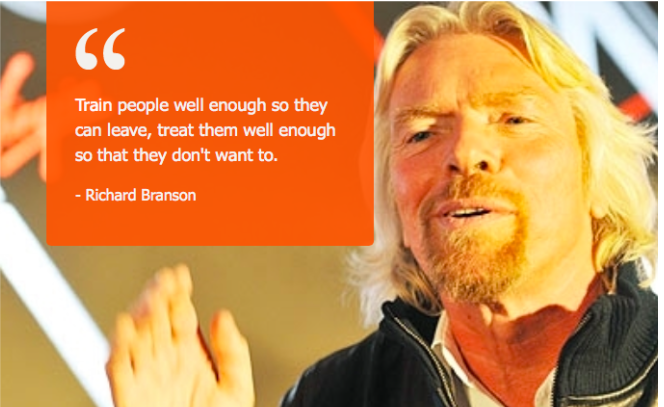According to TheBalanceCareers.com the average person changes jobs an average of 12 times throughout their career.
Reasons for changing jobs
Some examples of the common reasons why people change jobs include:
- Higher pay, better benefits and perks
- Relocation to a different geographic area
- Career advancement / promotions
- Choosing a less stressful environment
- Leaving an incompetent or negative boss
- Changing career focus
- Better work-life balance (in theory)
- Reorganization at their company (lay offs)
- Skills and abilities didn’t fit the job
- Lack of recognition for accomplishments
- Alignment between personal values and organizational priorities
These reasons can be individualized to unique circumstances. But at the end, the reality is this.
It’s the company’s fault. It has not put you, the employee, as its priority.
So you fill the void of being appreciated and recognized with the next closest thing — financial stability.
As a result, many people are stuck in a job they hate willingly because of a paycheck out of necessity.
The most common reasons why people changes jobs is because they are no longer happy, want to make more money, or for a new opportunity.
But mostly, for the money — if we’re being honest.
We are a species of wanting more
Society has programmed us to constantly want more — bigger homes, nicer cars, fancier vacations, etc. In turn, that requires you to make more money to fuel your growing wants.
There are other reasons to want to make more money — like saving for retirement, paying for your children’s college education, building a reserves to start a business, etc.
There is more to a job than meets the eye
Whether you’re working at Google, Amazon, Facebook, or some other company, you will have the same responsibilities wherever you go.
That doesn’t change much.
Losing interest to continue working for your company goes deeper.
I believe it is rooted in more psychological and emotional reasons – and manifest into your action to “start looking.”
Before I go any further, I would like to clarify one thing:
I am not a licensed psychologist or therapist – these are just my observations from over the past 20 years in the corporate world.
This is based 100% on my experiences of my 18-year career.
Your attitude and mindset towards your environment is everything
Whether you choose to stay or leave your job is largely influenced by how you feel towards the people you work with and for.
It goes much deeper than whether you are making $10,000 or $50,000 more a year.
A word of caution — the grass is not always greener on the other side.
You align with their approach to running a business when you feel connected to your company’s values — therefore you are highly motivated to help the company succeed with everything you’ve got.
Companies must start being worthy of their employees
This is a major shift of mindset and culture for many companies. Why?
Because traditional companies hold themselves in high regards — and to be offered a job is a privilege.
“Derek, you are lucky you got hired!” That was what my friends told me when I got my first job out of college.
What my friend was really saying was that the company that hired me found me worthy enough to be a part of their team — this is exactly what needs to change.
Leadership must adapt a more progressive mindset in building companies into the future — by asking if they are worthy, instead, of their employees.
How to be worthy of your employees
Putting your employees first.
After talking for hours with several mentors and coaches, I am ten times more convinced that it is every leader’s duty to always put their team’s well-being a priority.
You hired them, therefore it is your responsibility to make sure you create the best culture and core values to fuel their career growth.
Your failure to infuse your employees mindset with positivity and motivation will be entirely on your shoulders.
Success happens when employees believe in your vision — not your money.
Treating your employees well

Providing the best training to your employees is a given — it’s your responsibility and in your best interest to equip your employees with the best you can give.
But the second part is what separates the great companies from the rest.
Treating people well is not just about the free cafeteria snacks, lavish company dinners, free food, etc. Those are company perks.
Treating people well goes far beyond perks.
Are you creating opportunities for your people beyond the workplace? Is your company supporting social causes your employees can align with? Are leaders showing empathy to their teams.
Treat your people like humans, not a badge number of an employee ID.
Without your employees’ loyalty, your business will become irrelevant.
Stepping aside and leaving it to the experts.
You hire people for their expertise in areas that you’re a novice in, at best.
Therefore, instead of trying to control everything, start by stepping away from areas that you know very little about.
People with specialized skills decided to work for you because they want to help your business thrive — give them the respect and get out of their way.
You’re blessed to be worthy of their time, skills, and commitment.
It is a waste of everyone’s time, and an insult, to the people you hire, if you do not give them the autonomy to do what they are best at.
Asking what you can do to make things even better.
Develop the habit of asking for opinions and feedback on how and what we can do better as a team and as a company.
Your employees are on the front line.
They see, hear, and take the shots. They have insights into your customers’ wants and desires.
It would be absolutely dumb of you not to seek their feedback and listen to them.
Conclusion
As the founder of my ad agency, I have to constantly remind myself and be aware of the importance of putting employees first.
By listening and trusting people to do the job they’re hired to do will build rapport to form stronger relationships.
Companies that adopt this approach will retain the best people — build the best products or services, and have the highest chances of success.
What are your thoughts on putting people first in your business?


